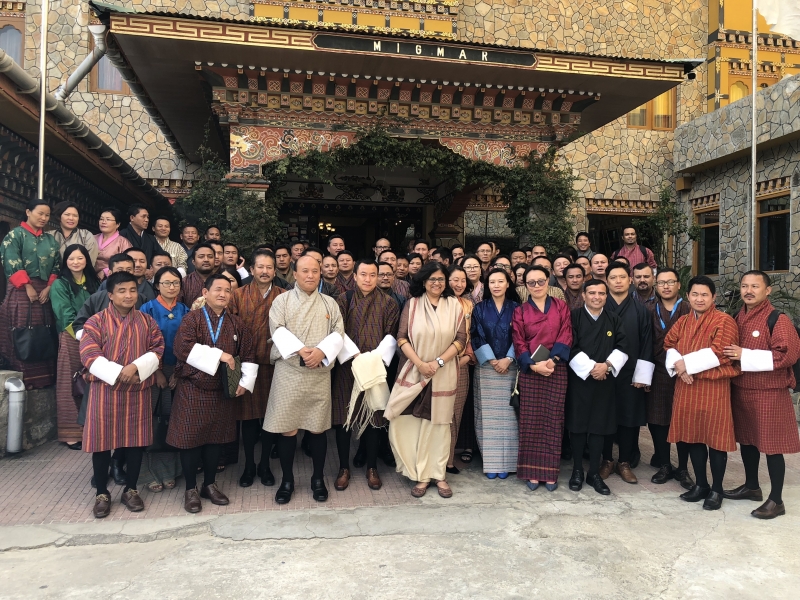About IDI
Our Cross-Cutting Priorities
Our Results
Meet the IDI Board
IDI's Board is composed of ten members from different supreme audit institutions. Get to know them better in our "Meet the Board" series.

After providing the required support as agreed in the Statement of Commitment signed between the IDI and SAI Bhutan, the IDI formally exited from the programme support while at the same time ensuring that the SAI Bhutan has a draft Sustainability Plan in place to sustain ISSAI implementation in SAI Bhutan. The IDI and SAI Bhutan conducted lessons learned and exit meeting in Thimphu, Bhutan from 11-13 September 2018. A total of 95 SAI personnel which included the Auditor General, SAI management team, audit team leaders and team members attended the meeting to draw lessons learned from implementation of ISSAIs in SAI Bhutan and to develop a draft sustainability plan.
The discussions were held in two different groups, i.e. the SAI management and audit teams to discuss and document lessons learned and to formulate the sustainability plan. The outputs from two different groups were discussed at the wider plenary session involving both the groups and the Auditor General. The project and mentor team are in the process of consolidating the results and sustainability plan. The IDI committed to providing its support to finalise the sustainability plan. Before engaging into focus group discussion with SAI management and audit teams respectively, the project team updated on the achievement of expected programme outputs and outcomes. The report indicated that SAI Bhutan had achieved all the programme outputs, while some of the outcome indicators were not due for reporting as on the date of the exit meeting. It was reported that SAI Bhutan had achieved more than what was planned in the programme.
While IDI had trained 60 auditors in compliance, financial and performance audits respectively, the mentor team and IDI trained auditors trained other auditors making the total number to 130 as of date. Some other significant achievements are; SAI Bhutan has ISSAI compliant audit methodologies for compliance, financial and performance audits (draft stage), compliance audit is mainstreamed as a separate audit practice, the QA policy is being drafted and QA guidelines are in place, the QA function is being strengthened, etc. Overall ISSAI has become a common language of auditing in SAI Bhutan.
While noting the significant achievements made in this capacity development interventions, SAI Bhutan has been going through a difficult time to retain the talents in its workforce. Most of the trained auditors on ISSAI based audits have either left for pursuing higher studies or resigned from the service. The Auditor General expressed his concern that this will continue to one of the biggest challenges. Despite several limitations, the IDI noted that SAI Bhutan maintained its commitments of the programme and continues to strive for sustaining the ISSAI based audit practice by having a robust sustainability plan in place. Once the sustainability plan is finalised, the SAI Bhutan intends to explore for partnership with donors and other peer institutions internationally and regionally to implement its plan for strengthening its institutional, organisational and professional capacities.
Over the period of a three-day meeting, the IDI and SAI Bhutan project team met with some key stakeholders of SAI Bhutan viz; Financial Secretary, Director of Gross National Happiness Commission, the Chair of Accounting and Auditing Standards Board of Bhutan, the World Bank Resident Representative and the Deputy Resident Representative of UNDP.
 |
|
 |
 |
 |
 |
 |
 |
| This workshop was part of the ISSAI Implementation Initiative Programme please visit our programme page here. |
|